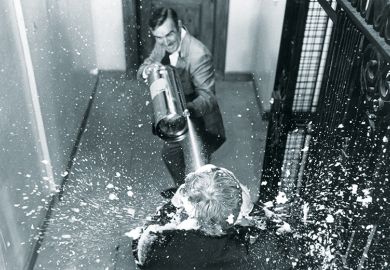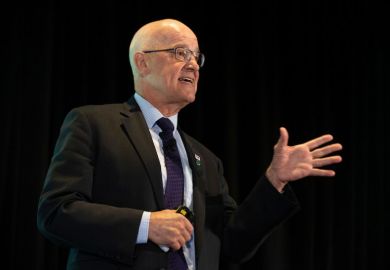Teaching small groups of undergraduates can be one of academia’s great pleasures. In my previous role as a professor at a small private US college, I knew my students well, and the most motivated and hard-working undergraduates were excellent. The brightest were as good as, if not better than, those at larger public universities where I have taught.
But those delights were overshadowed by what I believed to be low academic standards thrust upon me by university administration. For example, when I informed my students that they would need to study all materials on my physics course regardless of whether they would be on an exam, some students complained to the administrators, who seemed eager to take their side. In the end, my department chair demanded that I tell my class exactly what would be on their exam, question by question.
Another time, I was forced to throw out a quiz when a few vocal students complained that it was too difficult. My refusal to accept these standards – allied with persistent gender discrimination – led me to quit my profession.
The reasons for giving in to these poor-performing students are, unsurprisingly, financial. Institutions are motivated to allow students to be admitted and to progress regardless of academic concerns; in some instances that I observed, my institution actively sought to recruit such students.
Many students at my former institution assumed that their academic success and graduation was guaranteed. They also assumed – rightly – that their failure was ruled out upon payment of their tuition.
At their best, small non-elite colleges can spur innovative ideas and foster great minds, but too often they compromise standards and dilute the value of a degree by producing underqualified graduates.
Does it really matter if students are not hitting the heights that their professors expect? I believe we all should care. Our children's schoolteachers may be among these graduates. We may rely on them to make life-or-death medical decisions affecting ourselves or our loved ones. And, as taxpayers, we may be asked to provide tuition relief for those who were ill prepared to join the workforce and who make poor employees and colleagues.
Not all non-elite, small and private universities operate like my old employer, and nor are all of their graduates intellectually mediocre. However, even outstanding students can be dragged down if asked to study in an academically weak cohort of peers. Having an administration that lowers the bar for all students, treating them more like customers than students, worsens the problem.
Within two years, I realised that resisting these pressures was futile. I reluctantly lowered standards, not because I lost my conviction, but because of the unrelenting pressure from students and administrators to write easier assignments and tests and to give higher grades.
One assignment that I set at the beginning of the Covid-19 pandemic, in which students were paired with local seniors in an assisted living facility, was the final straw. Undergraduates met with their senior via Zoom to discuss connections between course material and the current social, economic and political context, as well as connections with the pandemic and public health more generally. As a disabled scientist, I wanted them to understand that science is more than just about uncovering new knowledge. It requires compassion and patience that yields little to no personal gain.
Some revelled in stepping outside their comfort zone and communicating with those from beyond their usual walk of life. But others failed to grasp this lesson; one student’s report stood out as grossly insensitive and entitled, with comments that were disrespectful and selfish. But instead of handing out the low grade they earned, I gave them an “A”. Based on previous experiences, I knew that this student would not accept anything less than a perfect grade, and I no longer had the capacity to fight a battle with administrators.
We need to rethink the current model of higher education and the role of private universities in the US. Specifically, we need to think through what can be done to address the growing concern that a student’s grades do not necessarily reflect their abilities. If a diploma does not necessarily reflect academic achievement, what is it really for?
The US higher education accreditation system is notoriously disjointed, reflecting how universities have sprung up independent of federal government. But the taxpayer subsidy may mean that it is time to consider requiring private institutions to attain the same accreditation as public institutions, regardless of revenue sources.
Maybe private institutions should even have the same or stricter admission requirements as state universities. The closure of some small, less-selective colleges that are struggling to maintain enrolment may not be the tragedy that many imagine if graduates are not reaching the required level of competency that the public would expect.
Everyone should take note of the declining academic standards of the private university system and recognise that it is up to all of us to be strong and ethical role models and to educate not only the mind but also the heart and soul of the next generation of our world’s leaders.
At the very least, we should support and encourage instructors in their efforts to uphold high academic standards.
The author was a physics professor at a small private college in the US.
POSTSCRIPT:
Print headline: Pressure to pass mediocre students made me leave academe
Register to continue
Why register?
- Registration is free and only takes a moment
- Once registered, you can read 3 articles a month
- Sign up for our newsletter
Subscribe
Or subscribe for unlimited access to:
- Unlimited access to news, views, insights & reviews
- Digital editions
- Digital access to THE’s university and college rankings analysis
Already registered or a current subscriber?








